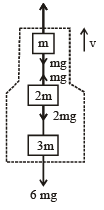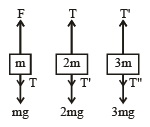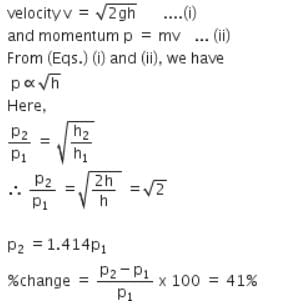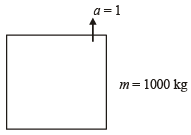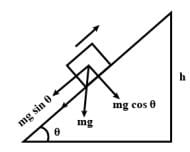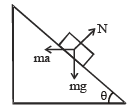31 Year NEET Previous Year Questions: Laws of Motion - 1 - NEET MCQ
15 Questions MCQ Test - 31 Year NEET Previous Year Questions: Laws of Motion - 1
A ball of mass 0.15 kg is dropped from a height 10 m, strikes the ground and rebounds to the same height. The magnitude of impulse imparted to the ball is (g = 10 m/s2) nearly: [2021]
A car is moving in a circular horizontal track of a radius of 10 m with a constant speed of 10 m/s. A bob is suspended from the roof of the car by a light wire of a length of 1.0 m. The angle made by the wire with the vertical is:
[2013]
[2013]
Three blocks with masses m, 2 m and 3 m are connected by strings as shown in the figure. After an upward force, F is applied on block m, the masses move upward at constant speed v. What is the net force on the block of mass 2m? (g is the acceleration due to gravity)
[2013]

[2013]

A stone is dropped from a height of h. It hits the ground with a certain momentum P. If the same stone is dropped from a height 100% more than the previous height, the momentum when it hits the ground will change by:
[2012M]
A car of mass 1000 kg negotiates a banked curve of a radius of 90 m on a frictionless road. If the banking angle is 45°, the speed of the car is:
[2012]
A conveyor belt is moving at a constant speed of 2m/s. A box is gently dropped on it. The coefficient of friction between them is µ = 0.5. The distance that the box will move relative to the belt before coming to rest on it taking g = 10 ms–2, is:
[2011]
A body of mass M hits normally a rigid wall with velocity V and bounces back with the same velocity. The impulse experienced by the body is:
[2011]
A person of mass 60 kg is inside a lift of mass 940 kg and presses the button on the control panel. The lift starts moving upwards with an acceleration 1.0 m/s2. If g = 10 ms–2, the tension in the supporting cable is:
[2011]
The mass of a lift is 2000 kg. When the tension in the supporting cable is 28000 N, then its acceleration is: [2009]
300 J of work is done in sliding a 2 kg block up an inclined plane of height 10 m. Taking g = 10 m/s2, work done against friction is:
[2006]
A block B is pushed momen tarily along a horizontal surface with an initial velocity V. If μ is the coefficient of sliding friction between B and the surface, block B will come to rest after a time ______.
[2007]

A body under the action of a force acquires an acceleration of 1 m/s2. The mass of this body must be:
acquires an acceleration of 1 m/s2. The mass of this body must be:
Sand is being dropped on a conveyor belt at the rate of M kg/s. The force necessary to keep the belt moving with a constant velocity of v m/s will be:
A block of mass m is placed on a smooth wedge of inclination θ. The whole system is accelerated horizontally so that the block does not slip on the wedge. The force exerted by the wedge on the block will be (g is acceleration due to gravity):
A car of mass m is moving on a level circular track of radius R. If μs represents the static friction between the road and tyres of the car, the maximum speed of the car in circular motion is given by:





